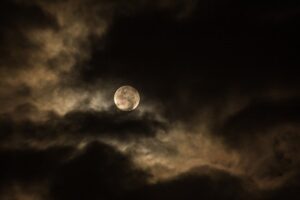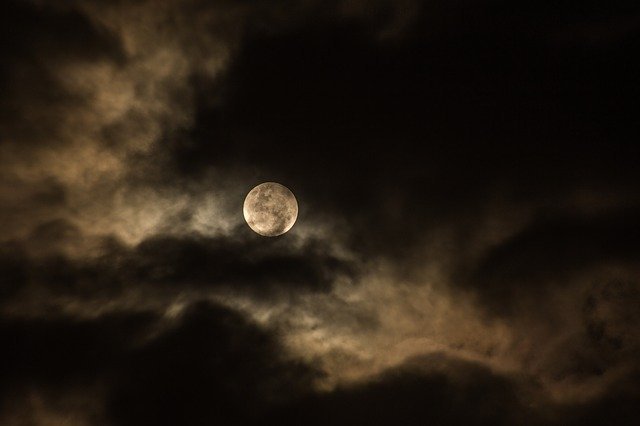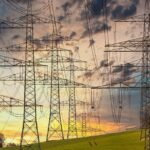
I’m always caught in a chain of What If thoughts whenever I think about the universe. I am confident that most of you would agree with me on this matter.
Our planet is, in fact, little more than a speck of dust in the cosmos, TBH!
This also implies that things we consider supernatural may actually be real somewhere in space.
What if our planet actually had more than one moon? Maybe even two moons.
Two celestial bodies that orbit around the Earth, just like our Moon does.
The notion is intriguing and many have tried to speculate on how it would’ve been had there been a second moon orbiting the earth.
Would life be different?
Would we have evolved differently?
What it is like for earth to have two moons?
An additional moon orbiting the earth is mostly similar to what we have now.
However, there are some fundamental differences that will definitely impact the Earth’s environment and all living things on it.
The most startling difference that comes into mind is that with two moons, the night would never fall upon our planet!
Or at least not completely…
Sea Levels Are Climbing
With two moons, Earth’s tidal pull would be far stronger than it is right now.
With high tides coming twice every day, the oceans would swallow up vast swaths of land all over the world.
This means that at least half of all cities would sink beneath the waves within a few decades.
It will take longer for the days to pass.
With two moons, the days on Earth would be longer, with most having more than 30 hours.
And not only that, but it would also mean that no day is completely light with nights always remaining at least partially illuminated, especially in tropical areas.
Earth’s Spin Would Be Out Of Sync With Moon’s Orbit
Since the axis of rotation and the orbital plane of moons do not always coincide, this may result in one moon passing over the other.
As we know, right now we have a full moon at certain phases of its orbit. This would be impossible with two moons orbiting the planet.
Furthermore, if both are full, their gravitational forces will produce stronger tides.
A Lot Of Volcanoes Will Appear
As we also know, the tides and their powerful influence on Earth’s crust are some of the main factors that could trigger volcanic eruptions.
And since both moons would be orbiting the planet at a different speed, this constant movement of landmasses may result in continuous earthquakes and volcanoes erupting all over the world.
Volcanoes also leave traces of thick dust that would eventually render the air unbreathable and severely affect all living things on Earth.
The Two Moons Will Have An Effect On Earth’s Climate
With two moons in our sky, it is very likely that there will be more extreme weather patterns globally.
Stronger winds, heavier rains and stronger tides are just some of the things to expect in this case.
Tides Will Be Nasty And Chaotic
Another consequence that may arise is that because of the combined gravitational forces, the Moon will face constant tidal bulges on its surfaces With two moons it will be almost impossible for them to maintain a regular cycle.
This may have devastating effects on the moon’s chronology of days, months and years.
In the end, it may cause the 13th month to appear irregularly.
What about the lives on earth with two moons?

There are just so many differences that may change life on Earth with an additional moon.
Two moons, instead of one will result in tidal waves that will increase water levels.
This implies that most coastal cities worldwide will be flooded with ocean waters very quickly. It’s safe to presume that this will have a huge impact on the landforms and geography of the planet.
With two moons, there will be no night which means the plants and animals on Earth will receive less sunlight. Of course, this will affect all life forms on Earth with possible mutations in some species or even extinction of others.
The most difficult part about living on a planet with two moons is that we would never experience darkness and it will be practically impossible for the plants and animals on Earth to have a regular sleep pattern.
In terms of astronomy, having two moons in orbit around Earth will be a source of confusion because each moon orbits at different speeds and in different directions.
This will certainly cause numerous tides and tidal waves which means there would be instability along the coasts worldwide. Also, there would be enormous changes in climate due to the constant night and day patterns.
All this will result in transient climatic conditions that can cause the extinction of other life forms on Earth.
- See also: What would happen if you didn’t drink any water
- See also: What would happen to your body if you were in the vacuum of space
Could the Earth Sustain Two Moons?
There is no doubt that the Earth could sustain two moons.
However, it’s hard to predict what kind of problems will arise when both are in orbit around Earth at different speeds and directions. It would be possible to have multiple tidal waves that move through the coastlines worldwide.
Also, there are strong winds that come with this scenario which means more natural disasters are likely to happen. So, if both moons co-exist together, there will be chaos on the Earth which will have a significant effect on life forms too.
One moon is a challenge, but TWO moons?
That is a lot to handle for any planet.
However, the Earth has been around long enough and it will have no problem coping up with another celestial body in its orbit.
Conclusion
In conclusion, multiple moons in one solar system can have devastating effects on the life forms that inhabit a planet.
It may be hard to determine which factors will have significant consequences for life as far as we know it is concerned. The only thing I’m certain about is that living with two moons will definitely result in a lot of problems.
Several factors need to be taken into consideration in this case that may have an impact on life forms.
It’s very difficult to determine which of them will be the most problematic because there are just too many things that are associated with living on a planet with two orbiting moons.



